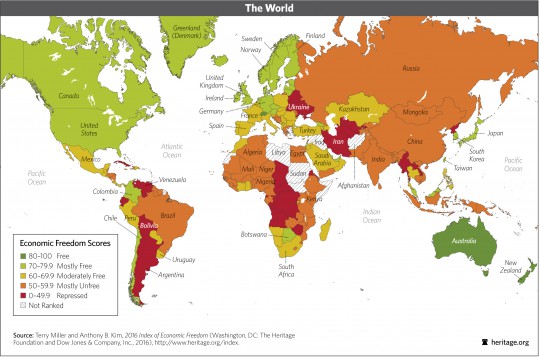The Heritage Foundation and Wall Street Journal recently released the 2016 Index of Economic Freedom. Despite modest gains in economic freedom worldwide, Americans have, for the eighth time in a decade, lost economic freedom. The global average score is 60.7, “the highest recorded in the 22-year history of the Index” with more than thirty countries including Burma, Vietnam, Poland, and others, received “their highest-ever Index scores.” 74 countries’ ranks declined, but they improved for 97.
The least free countries included North Korea with an abysmal score of 2.3, Cuba (29.8), Venezuela (33.7), and Zimbabwe (38.2).
Index Co-editors, Terry Miller and Anthony B. Kim, explain what the Index has proved in its two decades:
Historically, nations with higher degrees of economic freedom have flourished both economically and socially. Freer societies are better able to capitalize on the virtues of the free-market system in responding to the decisions and desires of individuals in constructive and efficient ways. They provide more and more varied opportunities for individuals and tend to create virtuous growth cycles characterized by efficient resource allocation, high value creation, and innovation.
The top 10 most economically free countries:
- Hong Kong (88.6)
- Singapore (87.6)
- New Zealand (81.6)
- Switzerland (81.0)
- Australia (80.3)
- Canada (78.0)
- Chile (77.7)
- Ireland (77.3)
- Estonia (77.2)
- The United Kingdom (76.4)
Unable to break into the top ten, the United States came in at eleven with an overall score of 75.4 (-0.8 change from 2015). In a new op/ed for the Wall Street Journal, Terry Miller, explains why the United States ranked where it did:
The U.S. score declined repeatedly during the Obama years thanks to dramatically increased government spending and regulations, a failed stimulus program that enriched the well-connected but left average Americans behind, and laws such as the Affordable Care Act, which denied the right of individuals to keep the health plans they already had, and as the president had promised.
…
Given the gains elsewhere, and the continued regression in the U.S., it is no wonder that so many Americans are angry this election year. As the Index notes, they have endured a full decade in which “government favoritism toward entrenched interests has hurt innovation and contributed to a lackluster recovery and stagnant income growth.”
About five million fewer Americans have jobs now than one would expect if historical trends had prevailed. Assistance programs like disability insurance and food stamps, necessary for some but relied on by rapidly growing numbers of Americans, cannot provide the same level of dignity, self-worth and independence that come from successfully holding down a job.
Miller concludes his commentary by noting that many countries around the world (especially developing nations) have flourished thanks to limited governments, rule of law, regulatory efficiency, and open markets. The United States need only to “rededicate” itself to these principles to reverse the negative trend of economic freedom.


